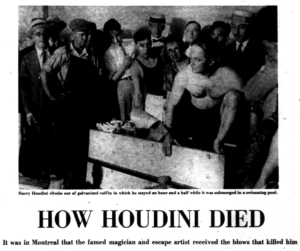Houdini died 90 years ago, today. What led to his death and was he killed?
The following snippet from an article written by Bayard Grimshaw gives a clue:
The full story of the events leading to Houdini’s death was first told, to the best of my knowledge, in a well-written, detailed article by Stanley Handman which appeared in the Canadian Weekend Picture Magazine for 12th September, 1953.
[Abracadabra Magazine Saturday 23rd March 1974 page 230]
For years, I thought this article referenced by Bayard Grimshaw was the same article that Patrick Culliton posted the text for on his houdinighost.com website, which was titled:
That was, until I was finally able to get a copy of the Canadian Weekend Picture article, which was titled:
It turns out the source for the 12th September 1953 article in the Canadian Weekend Picture article was the undated file (“Was Houdini Killed?” by S. J. Smiley) from the Fulton Oursler collection, currently in the Georgetown University Library.
FWIW: Fulton Oursler, aka Samri Frikell and Anthony Abbot, was an American journalist, playwright, editor and writer, who aided Harry Houdini in his crusade against fraudulent mediumship, and died May 24, 1952. Writing as Anthony Abbot, he was a notable author of mysteries and detective fiction. He also wrote under his own name on Christian themes.
With that, I leave you with a snippet from Was Houdini Killed? article to ponder:
While Houdini was thus discoursing and I drawing, there was a rap at the door, and Houdini’s secretary ushered in a rather tall individual – he must have been at least six foot two – wearing a blue gabardine coat that seemed much too small for him, and carrying three or four books under his arm. The newcomer appeared to have known Houdini and had, in fact, come that day to return a book Houdini had loaned him a few days before; his name was Whitehead, and he was the theological student at McGill University.
Whitehead was an oldish looking young man about twenty-seven or twenty-eight years of age. He impressed one as being the very genteel type of student. His face was ruddy, his hair very thin on top; his frame was powerful though loosely-knit, and his neck was inordinately long. He spoke softly with an exaggerated Oxford accent.
With the advent of Whitehead the conversation continued anew, and though I was disturbed from time to time by the fact that Houdini had to turn his head to answer Whitehead’s numerous queries (for he was an enthusiastic talker) I found a good deal of interest in what was said…
It seems that Houdini had been a detective for many years and had aided in unraveling so many mysteries and had read so many detective stories, that he boasted of being able to piece together any detective story, unknown to him of course, by hearing three or four paragraphs from different sections of such story. Whitehead, who had a mystery book with him, tried the experiment; he read excerpts from three or four different sections of the book, and Houdini apparently was able to give the gist of the story. At this juncture Houdini made an observation which I shall always remember, “think of the trouble I might have caused if I had used my talents for ill.”
More conversation and then Whitehead asked Houdini another question. “What is your opinion of the miracles mentioned in the Bible?”
Houdini tactfully replied, “I prefer not to discuss or to comment on matters of this nature. I would make one observation, however, – what would succeeding generations said of Houdini’s feats had he performed them in Biblical times? Would they have been referred to as ‘miracles’?”
Whitehead appeared to be somewhat taken aback at this statement.
It was at this point that Whitehead began to manifest what seem to me an astonishing interest in Houdini’s physical strength. Then, out of a clear sky, Whitehead asked, “is it true, Mr. Houdini, that you can resist the hardest blows struck to the abdomen?”
Thoughts?
Related:


This was definitely Silverman’s primary source for what went on in the dressing room.
Agreed! The interesting thing about this source is that it is not dated and appears to have been in the possession of Fulton Oursler who died more than a year earlier than the Stanley Handman article that was thought by many to be the first time the full story of the events leading to Houdini’s death was first told.
We recall a newspaper interview around the time Houdini arrived in Montreal that stated to the effect that Houdini had the look of death and have lost track of this article. Has anyone here a recollection of this?
Dick Brookz and Dorothy Dietrich
Hi D&D! Check your email.